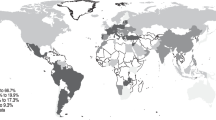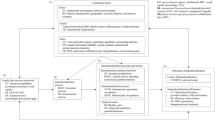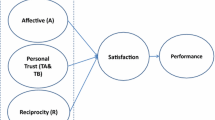Abstract
This research paper presents the authors’ experiment, an exploratory and causal investigation into the nature and specifics of the Romanian hospitality industry. Namely, they focus on how culture may impact both the involved service provider and the consumer and seek to ascertain, based on participant questionnaires, some of the best practices in the industry, and whether they are standardized across nations and cultures; how the certain differences in cultural norms may affect the strategies and practices of companies; as well as what particular interpersonal traits are desired (or, indeed, required) in the hospitality industry.
Access this chapter
Tax calculation will be finalised at checkout
Purchases are for personal use only
Similar content being viewed by others
Notes
References
Anderson, R., & Engledow, J. (1977). A factor analytic comparison of U.S. and German information seekers. Journal of Consumer Research, 3, 185–196.
Bauer, G. J., Baunchalk, M. S., Ingram, T. N., & LaForge R. W. (1998). Emerging trends in sales thought and practice (pp. 215–231). Westport: Quorum Books.
Coll, R. K., Zegwaard, K., & Hodges, D. (2002). Science and technology stakeholders’ ranking of graduate competencies part 1: Employer perspective. Asia-Pacific Journal of Cooperative Education, 3(2), 19–28.
Conti, R. C., & Cron, W. L. (1998). Selling in the future synthesis and suggestions. In G. J.
Hair, J. H. (2009). Marketing research in a digital environment. McGraw Hill Irwin.
Hall, E. T. (1966). The hidden dimension. New York: Doubleday.
Herskovits, M. J. (1948). Man and his works: The science of cultural anthropology. New York: Knopf.
Hofstede, G. (1983b). National cultures in four dimensions: A research-based theory of cultural differences among nations. International Studies of Management & Organizations, 13(1–2), 46–74.
Jensen, M. C. (1994). The nature of man. Journal of Applied Corporate Finance, 7(2), 4–19.
Jones, D. L., & McCleary, K. W. (2004). A model for assessing cultural impacts on international buyer/seller relationships for key accounts of hotel companies. Journal of Hospitality and Tourism Research, 28(4), 425–443.
Lashley, C., & Morrison, A. (2004). Em Busca Da Hospitalidade: perspectivas para um mundo globalizado, Sao Paulo: Manole.
Lew, A., & Kennedy, C. (2002). Cultural misconceptions. International Journal of Culture, Tourism and Hospitality Research.
Meng, F. (2010). Individualism/collectivism and group travel behavior: A cross-cultural perspective. International Journal of Culture, Tourism and Hospitality Research, 4(4), 267–274.
Millar, M., Mao, Z., & Moreo, P. (2008). Hospitality management educators vs. the industry: A competency assessment.
Morrison, A., & O’Gorman, K. (2008). Hospitality studies and hospitality management: A symbiotic relationship. International Journal of Hospitality Management, 27, 214–221.
Peabody, D. (1985). National characteristics. Cambridge: Cambridge University Press.
Reisinger, Y., & Turner, L. W. (2003). Cross-cultural behavior in tourism: Concepts and analyzis. Oxford: Butterworth-Heinemann.
Ren, C. (2010). Beyond hosts and guests: translating the concepts and understandings of cultural misconceptions. International Journal of Culture, Tourism and Hospitality, 4(4), 287–298.
Spowart, J. (2009). Hospitality management competencies- do faculty and students concur on employability skills? Proceedings of: 16th World Association for Cooperative Education Conference. Presented at the 16th World Association for Cooperative Education Conference, Vancouver, Canada.
Valachis, I. (2003). Essential competencies for a hospitality management career: The role of hospitality management education. Meeting of the Tempus-Phare No CD-JEP, 15007, 2000.
Wang, J., Ayres, H., & Huyton, J. (2012). Job Ready graduates: A tourism industry perspective. Journal of Hospitality and Tourism Management, 16(01), 62–72. doi:10.1375/jhtm.16.1.62.
Author information
Authors and Affiliations
Corresponding author
Editor information
Editors and Affiliations
Appendix 1 Proposed Questionnaire and Research Instrument
Appendix 1 Proposed Questionnaire and Research Instrument
We would seek to determine the value of Hospitality training in an education setting and the value to employers. Specifically, the initial research questions would be:
-
a.
Please rate the importance of the following skills and attributes as you search for them when hiring a new graduate, from a series of 39 skill sets and specifics.
-
b.
How satisfied are you with the theoretical knowledge demonstrated by recent hospitality school graduates?
-
c.
How satisfied are you with the practical skills and attributes demonstrated by recent hospitality school graduates?
-
d.
In your experience, how much time does a recent hospitality school graduate need in order to adapt to the workplace conditions?
-
e.
In your opinion, is there a gap between the knowledge, skills and attributes of the recent hospitality school graduates and the knowledge, skills and attributes the tourism industry requires?
-
f.
If “Yes,” what generates this gap?
-
g.
In your company, what measures do you take to ensure the level of knowledge, skills and attributes of the recent hospitality school graduates that you hire?
-
h.
What are the major problems you as an employer face regarding the workforce in your company?
Based upon the reviewed literature, we have built a framework consisting of 39 hospitality-based skills and attributes covering the following 6 domains:
Leadership and Management domain (Q 1–10)
-
1.
Problem-solving and analytical domain (Q 11–16)
-
2.
Interpersonal domain (Q 17–22)
-
3.
Business awareness domain (Q 23–17)
-
4.
Technical domain (Q 28–31)
-
5.
Personal domain (Q 32–39)
1–5 five-item Likert Scale questionnaire:
-
0 = N/A ,
-
1 = Extremely Unimportant ,
-
2 = Unimportant ,
-
3 = Neutral ,
-
4 = Important and
-
5 = Extremely Important .
Please rate the importance of the following skills and attributes as you search for them when hiring a new graduate.
1 Extremely unimportant | 2 Unimportant | 3 Neutral | 4 Important | 5 Extremely Important | |
|---|---|---|---|---|---|
1. Ability to make things | |||||
2. Pro-activity | |||||
3. Ability to motivate others | |||||
4. Negotiation skills | |||||
5. Collaborative influence | |||||
6. Fostering group management and facilitation | |||||
7. Seeing opportunities | |||||
8. Decision-making capabilities | |||||
9. Project/event management including scheduling and resource allocation | |||||
10. Capacity to conduct a basic strategic analyzis for a business unit | |||||
11. Information seeking | |||||
12. Critical/Analytical thinking | |||||
13. Dealing effectively with client problems | |||||
14. Anticipating client needs | |||||
15. Basic strategic analyzis capabilities | |||||
16. Effectiveness and calm in crisis situations | |||||
17. Emotional intelligence | |||||
18. Networking/relationship building abilities | |||||
19. Customer service skills | |||||
20. Cultural awareness | |||||
21. Team-working skills | |||||
22. Listening skills | |||||
23. Industry knowledge | |||||
24. Understanding the business or economic forecasts | |||||
25. Understanding the business model—how the business functions | |||||
26. Marketing and sales abilities | |||||
27. Legal understanding | |||||
28. Job related knowledge | |||||
29. Computer/IT skills | |||||
30. Technical expertise | |||||
31. Language skills | |||||
32. Personal and work ethics | |||||
33. Time management skills | |||||
34. Achievement/results orientation | |||||
35. Self-control | |||||
36. Desire for learning and acquiring expertise | |||||
37. Flexibility and adaptability | |||||
38. Excellent academic results (excellent grades) | |||||
39. Relevant work experience |
Additional Questions
-
1.
How satisfied are you with the theoretical knowledge demonstrated by recent hospitality school graduates?
-
a.
Extremely unsatisfied
-
b.
Unsatisfied
-
c.
Satisfied
-
d.
Extremely satisfied
-
a.
-
2.
How satisfied are you with the practical skills and attributes demonstrated by recent hospitality school graduates?
-
a.
Extrem ely unsatisfied
-
b.
Unsatisfied
-
c.
Satisfied
-
d.
Extremely satisfied
-
a.
-
3.
In your experience, how much time does a recent hospitality school graduate need in order to adapt to the workplace conditions?
-
a.
.
-
b.
.
-
c.
.
-
d.
.
-
a.
-
4.
In your opinion, is there a gap between the knowledge, skills and attributes of the recent hospitality school graduates and the knowledge, skills and attributes the tourism industry requires?
-
a.
Yes
-
b.
No
-
c.
I don’t know
-
a.
-
5.
If “Yes,” what generates this gap ? (open answer)
-
….
-
-
6.
In your company, what measures do you take to ensure the level of knowledge, skills and attributes of the recent hospitality school graduates that you hire?
-
a.
We do not take any measures because we only hire people that meet our criteria regarding the level of knowledge, skills and attributes
-
b.
All our new employees go through a standard training program to ensure compliance with our internal standards and levels of skills and knowledge
-
c.
We let our employees to learn by doing, therefore we do not take other measures
-
a.
-
7.
What are the major problems you as an employer face regarding the workforce in your company
-
a.
Difficulties in finding and attracting talented and well-equipped employees
-
b.
Difficulties in motivating and retaining good employees
-
c.
Low employee engagement and commitment to company
-
d.
Employee migration
-
e.
A greater gap between the university academic curriculum and the industry realities
-
a.
Demographics
Job Position
Board member
CEO/President/General Manger
Vice President
Head of business unit
Human Resource Manager
Marketing Department Manager
Financial Department Manager
Other Department Manager/Assistant Manager….
Other….
Highest Level of Education
High School Degree
Bachelor’s Degree
Doctoral Degree
Do You Have a Hospitality Degree?
Yes
No
Age
21–25
26–30
31–40
41–50
51–60
Older than 60
Sex:
Male
Female
Do You Hire Hospitality School Graduates?
Yes
No
Years of Experience in Hospitality
1–3 years
3–5 years
5–10 years
More than 10 years
Type of Business Ownership
Romanian
Foreign
Please State Which of the Following Best Describes Your Company? (one answer)
Privately owned
Government/State owned enterprise
Private Equity Portfolio Company
Publicly listed
Type of Business
Hotel—singular unit
Hotel—part of a Romanian chain
Hotel—part of an international chain
Restaurant—singular unit
Restaurant—part of a Romanian chain
Restaurant—part of an international chain
Travel Agency—singular unit
Travel Agency—part of a Romanian chain
Travel Agency—part of an international chain
**End of Questionnaire
Rights and permissions
Copyright information
© 2015 Editor(s)
About this chapter
Cite this chapter
Takacs, J., Vaduva, S., Cerghit, T. (2015). Growth, Security and Development in the Romanian Hospitality Industry. In: Vaduva, S., Thomas, A. (eds) Geopolitics, Development, and National Security. SpringerBriefs in Political Science. Springer, Cham. https://doi.org/10.1007/978-3-319-12685-2_4
Download citation
DOI: https://doi.org/10.1007/978-3-319-12685-2_4
Published:
Publisher Name: Springer, Cham
Print ISBN: 978-3-319-12684-5
Online ISBN: 978-3-319-12685-2
eBook Packages: Business and EconomicsBusiness and Management (R0)




